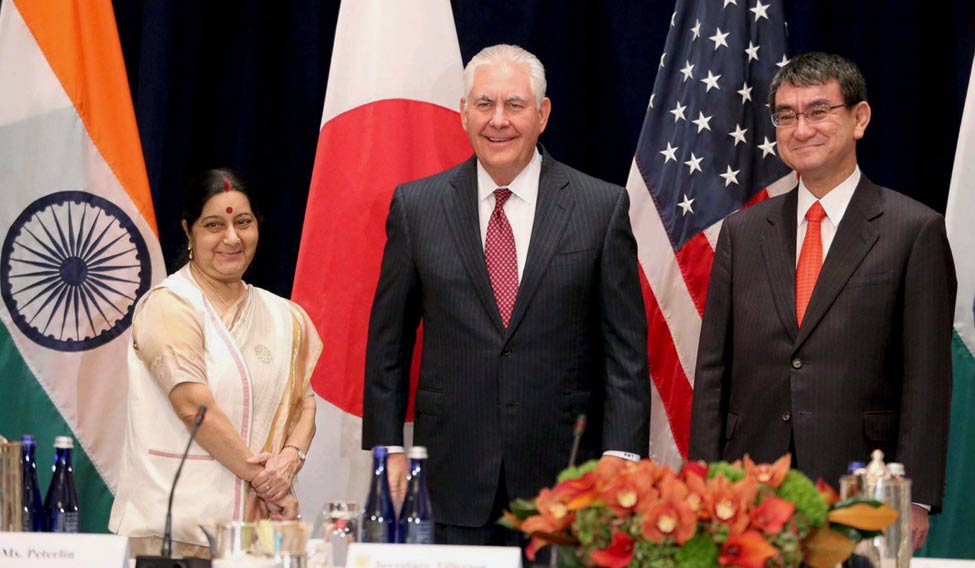External Affairs Minister Sushma Swaraj's packed trip to the UN began with a morning trilateral with US Secretary of State Rex Tillerson and Japanese Foreign Minister Taro Kono in New York.
Without actually naming China, the official statement released by them made it clear that the three were critical of the Asian giant's rising aspirations and were forming a united front to counter it. "The three ministers exchanged views on maritime security, connectivity and proliferation," said the statement, adding that they emphasised the need for ensuring freedom of navigation, respect for international law, and peaceful resolution of disputes. They agreed that on connectivity initiatives, the importance of basing them on international norms, prudent financing and respect for sovereignty and territorial integrity was important.
China's ambitious Belt and Road initiative was criticised by India as it proposed a route through Pakistan-occupied Kashmir, treading on India's sovereignty. India had, earlier this year, boycotted China's grand OBOR meeting, although many of its immediate neighbours like Nepal participated.
China's refusal to accept the international ruling on the South China Sea has also caused consternation. During Japanese Prime Minister Shinzo Abe's recent visit to India, he and Prime Minister Narendra Modi stopped just short of mentioning the South China Sea in their joint statement, but the proposed development of the Pacific Indian Ocean maritime routes was clearly a counter to China's maritime expansion.
Abe's visit caused eyebrows to be raised in China, especially when the talks of Japan developing the northeast region came up. Japan has not yet indicated in what capacity this development will be, though it will be infrastructural. Japan has a historical connect with places like Imphal and Kohima.
China was quick to say that there should be no third country involvement in border disputes. The scars of the recent Doklam standoff still haven't healed completely and China is wary of India's closeness with Japan. Japan, which joined in the annual US-India Malabar naval exercise this year, is seeking a greater role in this exercise in the future.
The tilateral is no good news for the dragon, just as Russia's bear hug with China is a cause of equal concern for India. Changing global dynamics has thrown up new alliances, keeping the world on tenterhooks.
The ministers also deplored North Korea's recent actions and stated that its proliferation linkages must be explored and those involved be held accountable. The nudge towards the Chinese hand in North Korea's nuclear programme was clear.
Later in the day, Swaraj also met with Tunisian foreign minister Khemaies Jhinaoui, Bhutan Prime minister Tshering Tobgay, Danish Foreign Minister Edgars Rinkevics, and Bolivian foreign minister Fernando Mamani.
The tete-a-tete with Tshering is also very important for India, post Doklam. India needs to keep Bhutan convinced that it can protect the mountain nation, so that it does not lean closer to China.





